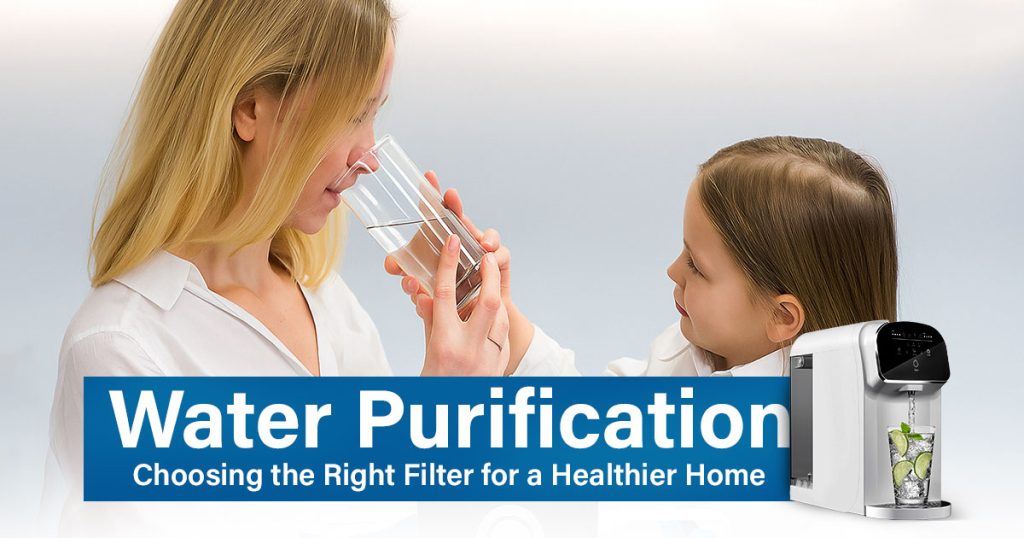Water purification is a process that removes harmful substances from water. This includes things you cannot see, like bacteria, viruses, and chemicals. The process makes water safe for you to drink and use every day.
You get many benefits from purified water. It solves the problem of bad-tasting water and unpleasant odors. It also protects your family from unseen dangers. Purified water gives you peace of mind and supports your health.
Choosing the right filter for your home is an important decision. There are many types, from whole-house systems to small pitchers. The best choice for you depends on the composition of your water and your specific needs.
This guide helps you understand everything about water purification. It gives detailed reviews of the top 5 filters. You learn how to choose the right one for your home and how purification leads to a healthier life. To help you find the right system, Water Filter Way offers detailed reviews, step-by-step guides, and maintenance tips for various filtration systems.
What is Water Purification?
Water purification is a process that removes harmful substances from water. These substances include bacteria, viruses, chemicals, and heavy metals. The process makes water safe for drinking and other uses. Clean water is essential for good health. It helps you stay hydrated and supports your body’s functions.
A good water filter provides many benefits. It protects you from waterborne diseases. It also improves the taste and smell of your water. Many people find their tap water has a bad chlorine taste. A filter removes this taste. It gives you a clean, refreshing drink every time. The United States Environmental Protection Agency (EPA) sets standards for safe drinking water. A quality filter helps you meet or exceed these standards in your home.
The choices for a water filtration system are dependent on the particular type of water filter. Some filters operate using a physical barrier to slow down the movement of large particles and debris. Others make use of activated carbon that attracts and retains the chemical impurities from water. Another method is reverse osmosis, which forces water through a very fine membrane that rejects the tiniest of contaminants. Each method helps you achieve safer, cleaner water at home.
How Water Purification Systems Work?
Water purification systems work by using different technologies to remove contaminants. There are ways to make your tap water safer and healthier to drink. Different filters target different types of impurities.
Here are the key ways a water purification system works to deliver clean, safe drinking water:
- Sediment Filtration
Sediment filters are the first step in a purification system. They are a physical barrier. They trap large particles like sand, silt, rust, and dirt. A sediment filter protects other parts of the system from getting clogged. It improves the clarity of your water. This method does not remove chemicals, bacteria, or viruses.
- Activated Carbon Filtration
Activated carbon filtration uses a special type of charcoal. It has a porous surface that attracts and holds onto many chemical impurities. Activated carbon is great for removing chlorine, pesticides, and other organic compounds. This process improves the taste and smell of your water. It does not remove dissolved minerals or heavy metals effectively.
- Reverse Osmosis (RO)
Reverse osmosis forces water through a very fine, semipermeable membrane. The membrane has tiny pores that block almost all contaminants, including dissolved solids, heavy metals, and bacteria. RO systems produce very pure water. However, they waste a lot of water in the process. They also remove beneficial minerals.
- Ultraviolet (UV) Disinfection
Ultraviolet (UV) disinfection utilizes a specialized UV light to eliminate microorganisms. The light zaps and inactivates bacteria, viruses, and parasites. This process is very effective against living organisms. It does not remove chemicals, heavy metals, or sediment. UV purifiers are used with other filters for complete treatment.
- Distillation
Distillation is an ancient purification method. It works by boiling water. The steam is then collected and condensed back into liquid water. The process leaves behind heavy metals, salts, and most other contaminants. Distillation provides very pure water. The process is slow and uses a lot of energy. The taste of distilled water is often flat.
Each method has its own strengths and weaknesses. Many modern systems combine several of these technologies. A multi-stage filter provides comprehensive protection against a wide range of impurities. It gives you peace of mind with every glass.
Which Type of Water Purification System Is Right for Your Home?
The type of water purification that is right for your home depends on your specific needs, the contaminants in your water, and your budget. First, test your water to know exactly what you are dealing with. A filter designed for city water may not work for well water. The right choice gives you peace of mind and healthier water.
Here are detailed reviews of the 5 top filters:
3M Aqua-Pure Whole House Quick-Change System AP904
Price: $442.73
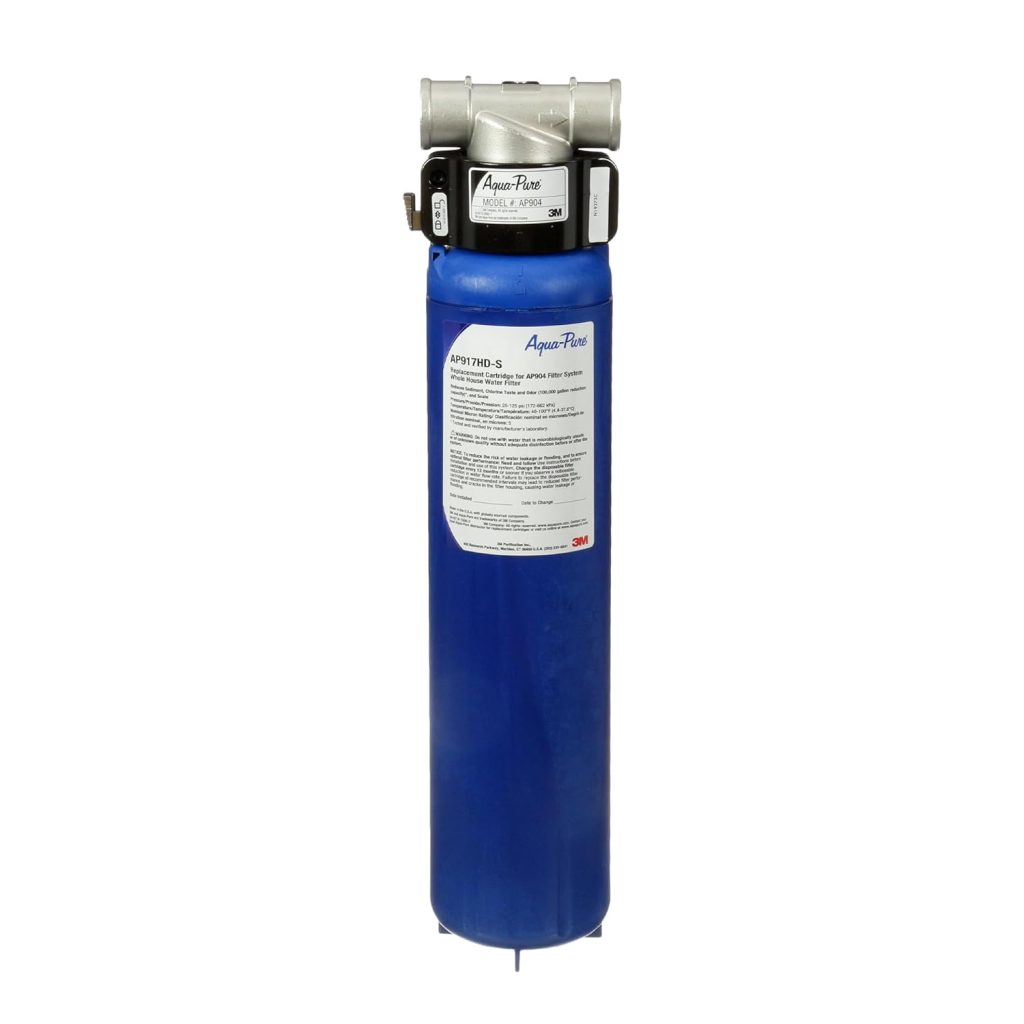
The 3M Aqua-Pure AP904 is a whole-house water filter. This means it filters all the water coming into your home. It uses an activated carbon block filter and a non-woven pleat media to reduce chlorine taste and odor.
Best case uses
This filter is great for larger homes. It handles high water flow rates up to 20 gallons per minute (GPM). It works well for both chlorinated city water and non-chlorinated well water. People who want to reduce sediment, chlorine, and scale throughout their entire house should consider this system.
Pros
- Improves your water quality as it is certified by the National Sanitation Foundation (NSF) to Standard 42 for reducing chlorine taste and odor.
- Maintains strong water pressure with a high 20 gallons per minute (GPM) flow rate.
- Protects your appliances by inhibiting scale buildup, extending their lifespan.
- Saves you time with the Sanitary Quick Change (SQC) system, making filter replacement quick and simple.
- Reduces maintenance with a high capacity of up to 100,000 gallons before replacement.
- Provides whole-house coverage by filtering all the water throughout your home.
- Offers durability with a stainless steel head designed for long service life.
Cons
- Does not address health-related contaminants such as lead or cysts, limiting protection.
- Does not reduce dissolved minerals or total dissolved solids (TDS), so water still contains hardness.
iSpring CU-A4 0.01μm Ultra-Filtration Under Sink Water Filter System
Price: $152.99
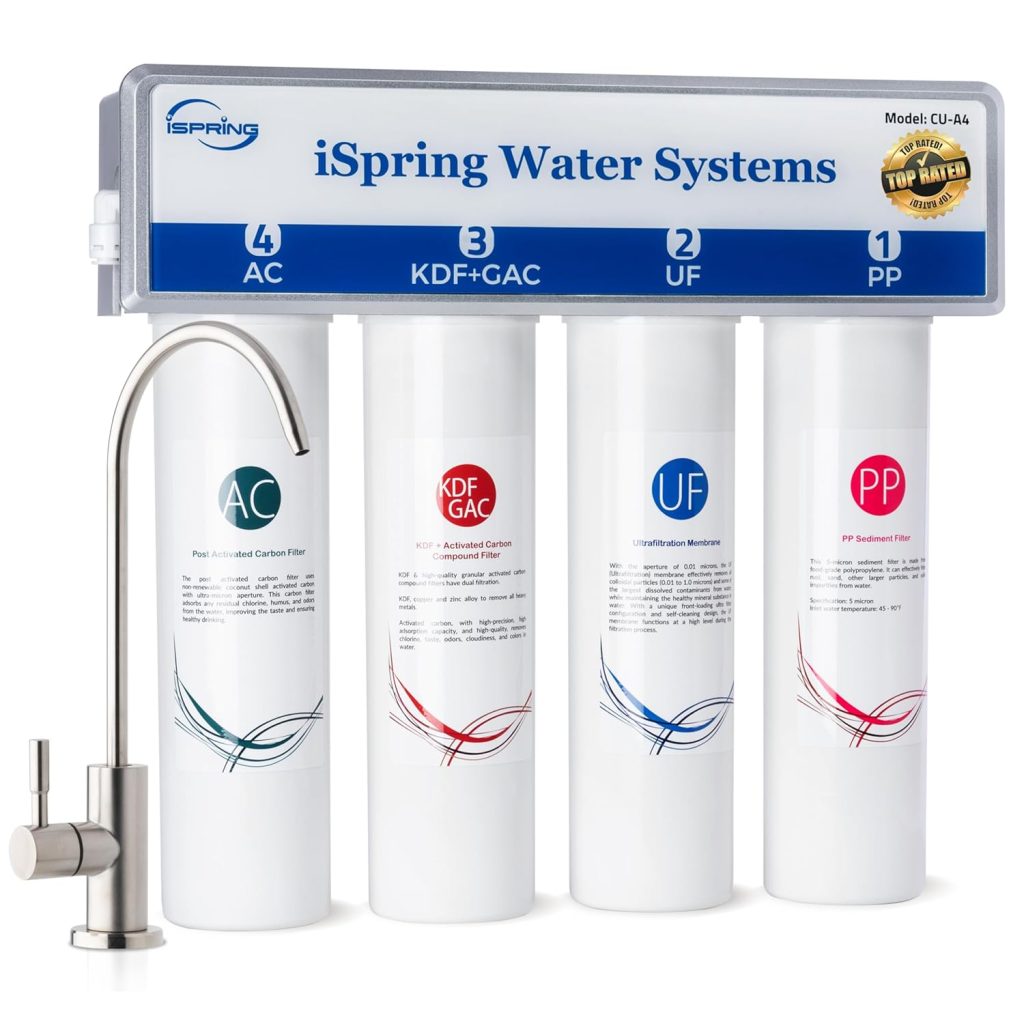
The iSpring CU-A4 is an under-sink water filter. It purifies water at one specific faucet, usually in the kitchen. The system uses a four-stage process to remove sediment, chlorine, heavy metals, and other common contaminants, providing clean, great-tasting water straight from your tap.
Best case uses
This filter is perfect for renters, apartments, and smaller homes. It is a good choice for anyone who wants high-quality drinking water without having to filter the entire house. It is also ideal for people who want to remove bacteria and other tiny particles without a reverse osmosis (RO) system.
Pros
- Protects your health with a 4-stage system that removes up to 99 percent of chlorine, lead, and other harmful contaminants.
- Eliminates bacteria and protozoa using a 0.01-micron ultra-filtration (UF) membrane.
- Keeps your water balanced by retaining beneficial minerals such as calcium and magnesium.
- Saves space in your kitchen with a compact, tankless under-sink design.
- Conserves resources by producing zero wastewater.
- Makes maintenance easier with quick-change cartridges for simple filter replacement.
- Provides peace of mind since all water-contacting parts meet National Sanitation Foundation (NSF) and American National Standards Institute (ANSI) standards.
Cons
- Does not reduce total dissolved solids (TDS), so it is not suitable for those wanting fully purified water.
- Limits filtration to a single point of use, rather than the whole house.
- Requires regular upkeep, with filters needing replacement every 6 to 12 months.
ZeroWater 40-Cup Ready-Pour 5-Stage Water Filter Dispenser
Price: $219.96
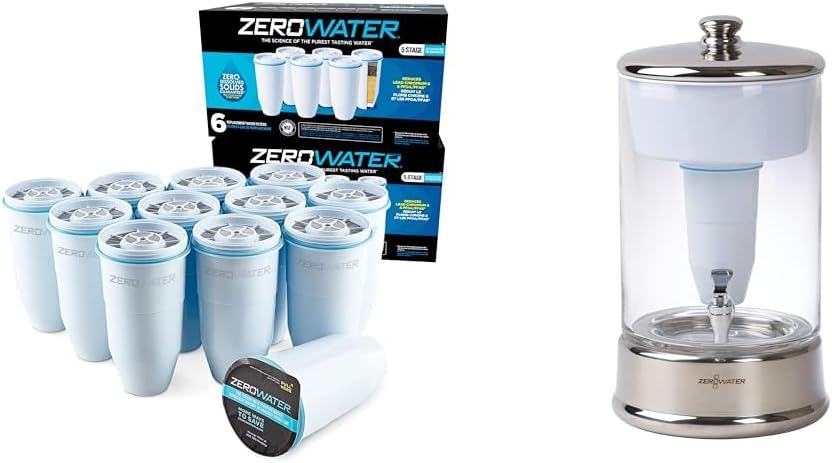
The ZeroWater dispenser is a countertop filter system that uses a unique 5-stage filtration process. This process includes activated carbon and an ion exchange resin. The glass dispenser features a “Ready-Pour” function, allowing you to dispense water while it is still filtering.
Best case uses
This system is ideal for individuals who desire the purest-tasting water at home or in an office setting. It is a good choice if you are concerned about lead and other heavy metals. People who want to reduce virtually all Total Dissolved Solids (TDS) from their water without a complicated setup should choose this filter.
Pros
- Protects your health with NSF (National Sanitation Foundation) certification that guarantees a reduction of lead, chromium, and PFOA (Perfluorooctanoic Acid)/PFOS (Perfluorooctane Sulfonate).
- Delivers cleaner-tasting water by removing almost all Total Dissolved Solids (TDS) with a 5-stage filter.
- Saves time with Ready-Pour technology, letting you dispense water while filtration continues.
- Reduces hassle with a large 40-cup capacity that minimizes the need for frequent refills.
- Cuts costs and plastic waste by replacing hundreds of single-use water bottles.
- Works anywhere without electricity, since it’s a manual system.
Cons
- Requires ongoing maintenance, as filters must be replaced once the TDS meter reaches 006.
- Takes up counter space, which is inconvenient in compact kitchens.
iSpring RCC7AK, NSF Certified, 75 GPD, Alkaline 6-Stage Reverse Osmosis System
Price: $234.99
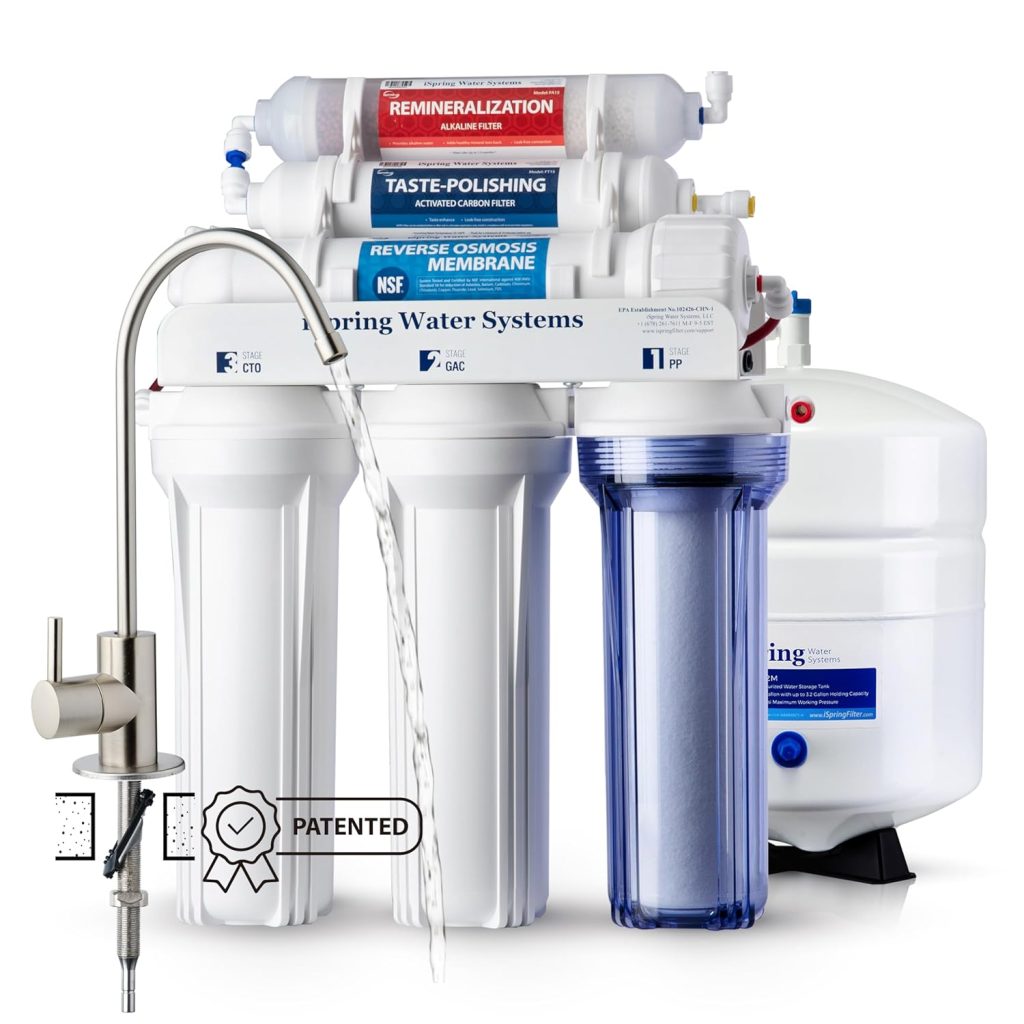
The iSpring RCC7AK is a 6-stage Reverse Osmosis (RO) system designed for under-sink installation. It uses multiple filters to purify water and then a special alkaline filter to add beneficial minerals back in. The system is certified by NSF International.
Best case uses
This system is an excellent choice for a family kitchen. It is for anyone who wants to remove a very wide range of contaminants from their drinking water. The system also appeals to people who want the benefits of RO water without losing healthy minerals.
Pros
- Certified by the National Sanitation Foundation (NSF) to Standards 58 and 372, ensuring the entire system meets strict safety and performance requirements.
- Protects your health by reducing a wide range of contaminants, including lead, PFAS, and chlorine.
- Improves taste and balance with a patented alkaline stage that adds back beneficial minerals.
- Makes monitoring simple with a transparent first-stage housing that lets you check filter conditions at a glance.
- Saves time during setup thanks to a patented top-of-sink installation design.
- DIY-friendly with quick-connect fittings that make filter changes fast and hassle-free.
- Gives you confidence with lifetime technical support from a U.S.-based company.
Cons
- Produces some wastewater as part of the reverse osmosis process.
- Requires enough space under the sink to fit both the filters and the separate storage tank.
- Needs a dedicated faucet installed on your countertop for filtered water.
UV Reverse Osmosis Water Filter Countertop
Price: $269.99
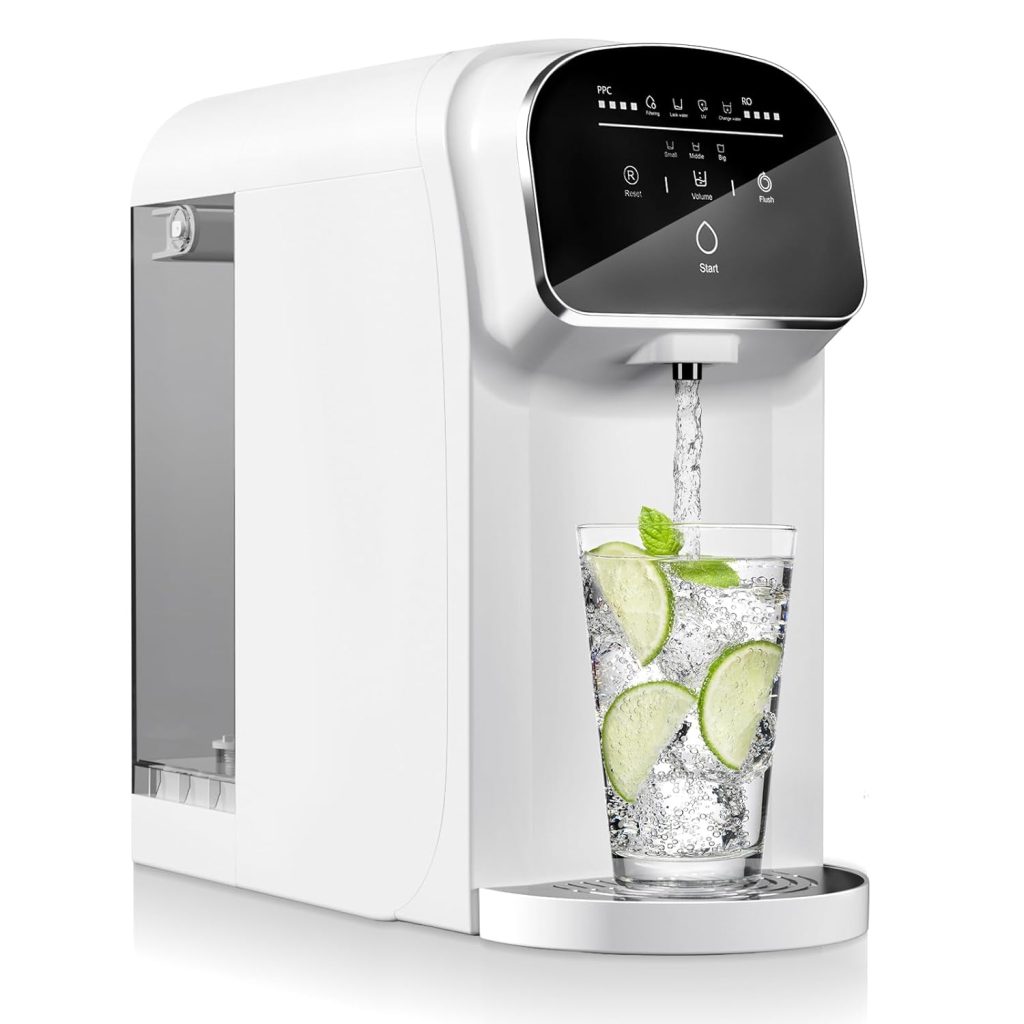
The UV Reverse Osmosis system is a countertop unit. It uses a powerful 5-stage process that combines Reverse Osmosis (RO) with UV-LED deep ultraviolet sterilization. The system has a self-cleaning feature and requires no plumbing installation.
Best case uses
This filter is a great solution for renters or people who cannot modify their plumbing. It is perfect for kitchens with limited under-sink space. People who want a very high level of water purification for both drinking and cooking, without any permanent changes, should choose this system.
Pros
- Protects your household with NSF/ANSI 58 certified Reverse Osmosis (RO) filtration for trusted safety.
- Removes 99.99 percent of microorganisms and viruses through a 5-stage process combined with UV light.
- Ensures cleaner, healthier drinking water by eliminating heavy metals and residual chlorine.
- Simplifies setup with a plug-and-play design that requires no installation.
- Saves water and cuts waste thanks to an efficient 5:1 pure-to-drain ratio.
- Fits neatly in your kitchen with a compact design suitable for countertops or islands.
Cons
- Occupies countertop space, which may be inconvenient in smaller kitchens.
- Costs more upfront than many other countertop filter systems.
- Relies on a power outlet, making it unsuitable for off-grid use.
Water Filter Types Comparison Table
| Filter System | Price | Main Function | Certifications | Capacity | Best For |
| 3M Aqua-Pure Whole House AP904 | $442.73 | Whole-house sediment and chlorine taste/odor reduction. | NSF Standard 42 (chlorine reduction) and 372 (lead-free materials). | 100,000 gallons | Large homes with chlorinated or well water, protecting appliances, and improving water quality throughout the house. |
| iSpring CU-A4 Under Sink | $152.99 | Under-sink multi-stage ultrafiltration for drinking water. | NSF/ANSI standards for safety and water quality. | 500 gallons | Renters, apartment, or small homes who want high-purity drinking water without full installation or wastewater. |
| ZeroWater 40-Cup Dispenser | $219.96 | Countertop pitcher that removes nearly all Total Dissolved Solids (TDS). | NSF certified to reduce lead, chromium, and PFOA/PFOS. | 40 cups | People who want extremely pure-tasting water and an alternative to bottled water. |
| iSpring RCC7AK Under Sink | $234.99 | Under-sink reverse osmosis to remove contaminants and add back healthy minerals. | NSF 58 and 372 | 75 Gallons per Day (GPD) | Family kitchens need comprehensive filtration that removes contaminants while keeping beneficial minerals. |
| UV Reverse Osmosis Countertop | $269.99 | Countertop system with advanced RO and UV purification. | NSF/ANSI 58 (RO performance) | 529 gallons | Renters or anyone who wants the highest level of purification without permanent plumbing changes. |
How Water Purification Improves Water Quality at Home?
Water purification improves water quality at home by removing invisible threats and making water safer to drink. A good filter gives you peace of mind with every glass.
Here is how it improves your water:
- Removes Harmful Contaminants
Home filters eliminate unwanted guests in water, including bacteria, viruses, and tiny parasites, and harmful chemicals such as chlorine, pesticides, and industrial wastes. Purified water thus protects your family from these hidden threats.
- Better Taste and Smell
The unpleasant taste and smell of tap water are attributed to the presence of chlorine used for disinfection. The water filter removes chlorine and other impurities. It makes your water taste clean, fresh, and pure. Filtered water also enhances the taste of your coffee, tea, and food.
- Removes Dirt and Grit
Some water has visible particles. You see rust, sand, or dirt in your tap water. Filters act like a fine screen. They trap these sediments and particles. Your water looks crystal clear when it comes from a purifier.
- Maintains Healthy Minerals
Some advanced purification methods remove everything from water. Other filters are more selective. They remove the impurities but leave in beneficial minerals. Minerals like magnesium and calcium are good for your body. A balanced filter gives you safe water without removing these healthy minerals.
- Protects Your Appliances
The impurities present in the water cause scaling and corrosion, which begin to form inside your appliances. They cause damage to the dishwasher, ice maker, and water heater. Filtering your water helps to protect these valuables and extend their lifespan.
- Supports Your Health
Clean water is crucial for a healthy body. It plays a role in everything from digestion to circulation. Drinking pure water keeps you hydrated and supports your body’s functions. Purified water protects you from waterborne diseases and chemicals.
- Good for the Planet
Using a home water filter is a smart environmental choice. You no longer need to buy single-use plastic water bottles. A home filter reduces plastic waste and saves you money. It is a simple step you take for a healthier planet.
Choosing to purify your water is a simple step for a big return. You take control of your home’s water quality. You get to enjoy peace of mind every time you use your tap. It is a simple investment in the health of your family and the life of your appliances.
What to Look for When Buying a Water Purifier?
When buying a water purifier, look for key features that align with your specific needs and home environment. A little research helps you make a confident decision.
Here are the main factors to consider:
- Know Your Water
The first step is to know what is in your water. City water has chlorine. Well water has different contaminants, like bacteria or heavy metals. But a simple home test kit to learn about your water quality. Knowing your water helps you choose a filter that targets the right impurities.
- Filter Capacity and Speed
Filter capacity is the amount of water a filter cleans before you replace it. This is measured in gallons. A filter with a higher capacity needs to be changed less often. The flow rate is how fast the water comes out. A whole-house filter needs a high flow rate. A countertop filter needs a good flow rate for a steady pour.
- Check for Certifications
Certifications from independent groups are very important. The National Sanitation Foundation (NSF) International is a respected one. An NSF certification means your product has been tested and verified for what it claims. It ensures quality and safety. Always look for a respectable certification on the product packaging.
- Warranty and Support
A good warranty safeguards your investment. It shows that the company has confidence in its product. On a whole-house system, look for a robust warranty on major components. Good customer support is also a plus. It helps you with questions about installation, maintenance, and problems.
- Costs to Consider
A filter’s cost involves more than just the purchase price. You have to consider the cost of replacement filters over time. A cheaper filter has expensive cartridges. A more expensive filter has a long-lasting cartridge. You should calculate the total cost for the first year to see the real price.
Choosing a water purifier is a personal decision. You have to find the right balance of features, cost, and effectiveness for your home.
How Water Purification Leads to a Healthier Life?
Water purification leads to a healthier life by protecting your body from unseen dangers and supporting overall wellness. The water from your tap contains many things besides H2O. A good filter is the best way to ensure you drink and use only the purest water at home.
A quality filter acts as a barrier. It removes harmful contaminants that cause sickness and long-term health problems. This includes bacteria like E. coli and parasites like Giardia. Filters also take out chemicals and heavy metals. These substances find their way into our water systems through industrial and agricultural runoff. A report from the Centers for Disease Control and Prevention (CDC) showed that waterborne diseases cause tens of thousands of illnesses each year. Purified water helps keep your family safe from these dangers.
Clean water also makes your body feel better. Proper hydration is a key part of good health. It helps with digestion, gives you more energy, and improves the look of your skin. Drinking great-tasting, purified water encourages you to stay hydrated throughout the day. This simple habit improves your health. You also use clean water for cooking. This prevents contaminants from getting into your food.
A water filtration system gives you a healthier home. For a complete guide to finding the right system, visit Water Filter Way. It offers detailed reviews, step-by-step guides, and maintenance tips for various filtration systems.
Are portable water filters safe for home and outdoors?
Yes. Portable water filters are safe for both home and outdoor use. They provide a reliable way to get clean drinking water. Their primary function is for outdoor use, like camping, but they also serve as an important backup for home emergency kits.
Does a water purifier reduce TDS (Total Dissolved Solids)?
No, not all water purifiers reduce Total Dissolved Solids. Only systems like Reverse Osmosis (RO) and Deionization filters effectively lower TDS levels. Other common systems, such as Ultrafiltration (UF) and UV purifiers, focus on killing microbes rather than removing dissolved minerals or salts.
Is distilled water better than purified water?
No. Distilled water is not better than purified water. Purified water is preferred for drinking because it contains some healthy minerals. Distilled water is processed to be as pure as possible. It is mainly used for medical or laboratory applications, not for drinking.
Are UV filters effective during power outages?
No, UV filters are not effective during power outages. They require a constant supply of electricity to operate their lamps. The UV light is what kills microorganisms. Without power, the UV light does not work, and water is not disinfected.
Which water filter cartridges are best for cleaner, safer well water at home?
The water filter cartridges that are best for cleaner and safer water at home depend on what is in your water. First, you should test your water for contaminants like iron, bacteria, or chemicals. A filter with multiple stages, like a sediment filter, activated carbon, and UV light, is the best choice for well water.
Can water purification systems increase water waste?
Yes, some water purification systems increase water waste. Reverse Osmosis (RO) systems, in particular, use a lot of water to flush out impurities. Standard RO systems produce about one gallon of purified water for every three to five gallons of rejected, or wasted, water.
What certifications should I look for in a purifier?
Certifications you should look for in a purifier: a certification from a third-party organization. A certification from NSF International (National Sanitation Foundation) or WQA (Water Quality Association) means the purifier has been independently tested to meet strict standards for performance and safety.
How does a water purification system improve home health?
A water purification system improves home health by removing harmful contaminants. It takes out substances like bacteria, viruses, and chemicals such as chlorine and lead. This protection from waterborne illnesses gives you peace of mind. It also makes you more likely to drink water, improving overall hydration.
How often should I change water purifier filters?
You should change your water purifier filters every six to twelve months on average. However, the exact timing depends on the type of filter, your water quality, and the frequency of use. Always follow the manufacturer’s specific instructions. Watch for signs of a clogged filter, like slow flow.

